Bookish Take – Women In SFF Edition: Guest Post by Gabriela Houston and Caroline Hardaker
Today, we welcome authors Gabriela Houston and Caroline Hardaker to the Hive to discuss Women in speculative fiction.
Before we launch into their discussion, check out the synopses of their latest novels, both available from Angry Robot Books:
In a world which believes her to be a monster, a young striga fights to harness the power of her second heart, while her mother sacrifices everything to stop her…
In an isolated mountain community, sometimes a child is born with two hearts. This child is called a striga and is considered a demon who must be abandoned on the edge of the forest. The child’s mother must then decide to leave with her infant, or stay and try to forget.
Nineteen year-old striga, Salka, and her mother, Miriat, made the choice to leave and live a life of deprivation and squalor in an isolated village. The striga tribe share the human belief that to follow the impulses of their other hearts is dangerous, inviting unspoken horrors and bringing ruin onto them all.
Salka, a headstrong and independent young woman, finds herself in a life threatening situation that forces her to explore the depths of her true nature and test the bonds between mother and child…
Order Your Copy | Review of The Second Bell | Interview with Gabriela Houston
In a society where self-preservation is as much an art as a science, Norah and Arthur are learning how to co-exist in their new little world. Though they hardly know each other, everything seems to be going perfectly—from the home they’re building together to the ring on Norah’s finger.
But survival in this world is a tricky thing, the air is thicker every day and illness creeps fast through the body. And the earth is becoming increasingly hostile to live in. Fortunately, Easton Grove is here for that in the form of a perfect little bundle to take home and harvest. You can live for as long as you keep it—or her—close.
Order Your Copy | Review of Composite Creatures | Interview with Caroline Hardaker
[Gabriela Houston]: Hi Caroline, so shall we get the obvious BIG (if dumb) question out of the way first: why do you write from a women’s point of view?
[Caroline Hardaker]: Hmmm indeed!
Well I wouldn’t like to think I’m drawing on my own life experience (readers of Composite Creatures might understand why!) but the inner workings of having to make some pretty tricky choices is always something I’m fascinated by.
And being a woman myself, I wanted to write from a point of view where family, motherhood, and the relationships between mothers and daughters are important.
If her fiancé Art had been the protagonist, the story would have gone down a completely different road entirely!
[GH]: I think if Art had been the protagonist, Composite Creatures would have been more of a haiku than a novel, to be fair.
[CH]: Yep. you’re not wrong.
What about you, though? You could say there are multiple women protagonists in The Second Bell…
[GH]: I’m drawn to the stories about the underdog, and really, for most of human history that pretty much described (and still describes) women. Since a very young age I have identified as a feminist, seeing the discrimination on both small and large scale that women experience; and the way their role has been defined in different societies is something that interests me greatly.
In The Second Bell we have Miriat, who chooses her daughter above all else. And there’s a paradox there, because she comes from a society where being a wife and a mother is supposed to be an essential part of a woman’s identity, but only as long as the child she bears fits within the societal expectations of what a child should be like. Because her daughter is a striga, Miriat’s expected to suddenly abandon her, as well as any mothering duties and feelings towards that child. In many ways it’s policing not just the bodies but also the inner thoughts of women that TSB centres around.
[CH]: Ahhh I see! I suppose my novel explores those themes a little too. Norah’s looking back to her mum’s life and looking ahead to what she might leave behind are dismissed by Easton Grove, the private ‘healthcare organisation’ she joins.
[GH]: So in CC, did you know from the start the kind of character you wanted Norah to be? She’s quite spineless really, and wants to lean on others for direction. Why did you decide to write her like that?
[CH]: Yeah, she is a bit spineless! But in many ways she’s just trying to make her way in the world, just very quietly, gently. I knew Norah wasn’t going to be the hero who breaks down walls. She’s the every day, relatable human who asks questions but trusts the answers.
Interestingly though, the end of the novel was initially very different, in the sense that Norah made a very different stand to how she does in the finished novel. But when editing, it just didn’t seem right. I wanted the end to reflect the end we could all face if we chose to look away…
[GH]: I really like that you say she trusts the answers, because for me a big part of growing up was realising how much people do look for and look up to authority figures. So I think that Nora’s portrayal is really true to that need for outside guidance and leadership, even at the cost of your own beliefs.
[CH]: Totally!
The Grove becomes a replacement for family to so many people, and you always trust those you think love you.
[GH]: I’ve always been very suspicious of orthodoxy and figures of authority, and so I guess I’m interested in what makes people trust their own instincts over the rules they were brought up to believe.
As to writing strong women, most women I know are strong, because the world doesn’t give them any other options really.
[CH]: True! It probably starts out as resilience, and then grows as strength.
[GH]: In the opening scene of TSB, we witness the moment where the townfolk’s attitude towards Miriat changes. One moment she is a beloved family member, neighbour and friend; a good wife and daughter. But the moment she chooses her daughter over the rules of the town she is cast out in the most vicious way.
I think women brought up in “benevolent” patriarchal structures like I was might recognise the pattern. You’re a princess on a pedestal (as long as you scrub it yourself) but if you step out of line you become an outcast, reviled and ostracised. Being able to rely on yourself and your inner strength reserves is a necessity
Do you envision Norah making a different choice, given a different set of circumstances or would the stakes have always been too much for her?
[CH]: Yep, it’s something we see the world over. Norah definitely plays into it – but it’s her friends who are the stronger female characters. Her best friend Aubrey is a campaigner against the genetic research Easton Grove stands for, and is probably more like the usual strong female protagonists we want to see! But I wanted to write from the perspective of someone who sees that strength, who tastes it, and then chooses that it’s not for her.
[GH]: I love that you had those other characters in CC who do choose the “right” thing, and that Norah still saw it and realised she doesn’t have that in her. There was a moment in your book where you can really feel her just give up in a way.
[CH]: Yeah, it’s a very organic thing for her to go with the flow to a degree. And then the times she puts up a bit of a fight don’t always end well, do they?
Are your characters inspired by any other strong women characters you’ve read about or watched in films? If not – do you have any favourites anyway?
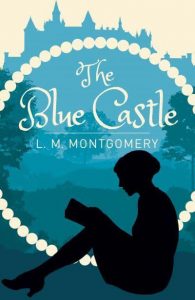 [GH]: I often mention Lucy Maud Montgomery’s The Blue Castle as a book which strongly influenced me. The character in it, Valance, doesn’t start off as someone we’d see as strong at all. She’s completely under the thumb of her domineering mother, allowing herself to be constantly humiliated and diminished by her rich family, terrified that should she offend them, she might have nothing but poverty to look forward to in her inevitable old-spinsterhood. Her one method of escape is reading nature books she borrows from the library. Then she finds out she has a heart condition which will surely end her life within a year. And she overcomes the habit of a lifetime, as well as her own belief in her own worthlessness and she sets out to live as she wants, for once ignoring how others see her. Her transformation is something I love to go back to.
[GH]: I often mention Lucy Maud Montgomery’s The Blue Castle as a book which strongly influenced me. The character in it, Valance, doesn’t start off as someone we’d see as strong at all. She’s completely under the thumb of her domineering mother, allowing herself to be constantly humiliated and diminished by her rich family, terrified that should she offend them, she might have nothing but poverty to look forward to in her inevitable old-spinsterhood. Her one method of escape is reading nature books she borrows from the library. Then she finds out she has a heart condition which will surely end her life within a year. And she overcomes the habit of a lifetime, as well as her own belief in her own worthlessness and she sets out to live as she wants, for once ignoring how others see her. Her transformation is something I love to go back to.
I’m not interested in characters who do the right thing because they are endlessly wise and honourable. I’m interested in the characters’ growth and the moment they find out who they truly are when pushed against the wall.
I love that in Composite Creatures Norah is forced to face herself and sees that there are truly no hidden depths to her, because that is not what people expect mostly I think.
We tend to expect the protagonists to draw on their inner reserves in times of crisis. But Norah, metaphorically speaking, simply shrugs her shoulders and admits she has no inner reserves.
[CH]: Yes! Regardless of gender, this is when we all find out what we’re made of. When we’re against the wall. Nora’s very much not of the ‘chosen one’ trope!
I always struggle to remember strong protagonists who inspire me. Most of my favourite books are narrated by very morally grey people who aren’t heroes.
[GH]: Can you give an example?
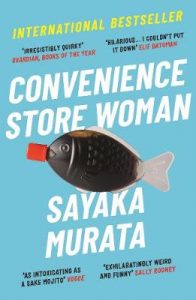 [CH]: So I recently read Convenience Store Woman, in which the protagonist mostly just goes about her day, finding meaning via her job in a convenience store. She’s not a hero, but she’s totally relatable. She doesn’t dream big at all, she really just wants to find her place in the world.
[CH]: So I recently read Convenience Store Woman, in which the protagonist mostly just goes about her day, finding meaning via her job in a convenience store. She’s not a hero, but she’s totally relatable. She doesn’t dream big at all, she really just wants to find her place in the world.
If I’m going to throw some characters out there who ARE heroes though, I’ll talk about Terry Pratchett’s Granny Weatherwax and Nanny Ogg. They’re just 100% everything they want to be and generally don’t give a toss about what anyone else thinks.
[GH]: I think if we go down the rabbit hole of talking female protagonists in Terry Pratchett’s novels we’ll be talking till Christmas! I love all of the Discworld.
[CH]: He writes women so well! I reckon Tiffany Aching has inspired many a young adult to grab the world in her fists.
But if we’re talking female authors in SFF – I’ve really been shouting about Aliya Whiteley recently. Ever since I read The Beauty.
[GH]: I haven’t read that one yet, but she’s on my TBR list definitely!
[CH]: Do it! It’s so utterly creepy and weird. My favourite things!
[GH]: The trend I have noticed recently, and which I want to see more and more of, is books with female protagonists, which don’t centre around romance.
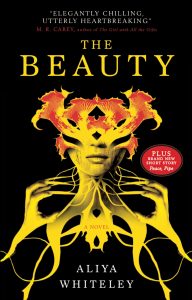 [CH]: Totally. Stories where the woman doesn’t even reject romance, it’s that it just doesn’t have a place in the story. Womanhood too often is written hand in hand with romance, subconsciously I reckon!
[CH]: Totally. Stories where the woman doesn’t even reject romance, it’s that it just doesn’t have a place in the story. Womanhood too often is written hand in hand with romance, subconsciously I reckon!
[GH]: I don’t mind romance thrown into the mix, but some of the recent books I read made me realise just to what extent their love life forms the centre of most female character’s journeys in traditional SF.
[CH]: Ahh I see – like romance is too often an integral part of the quest?
[GH]: I think when it comes traditional Fantasy, women are portrayed very much within the bounds of the three archetypes – Maid, mother, crone.
The character is either an object of the true main character’s desire, the realisation of his journey as a wife (or the mother of his child) or an ancient wise woman/witch.
And because motherhood hasn’t historically been seen as a very interesting part of human experience, and not one worthy of exploring, the only option for the female protagonist was to be a young girl in search of a mate (because having an old protagonist would have been ridiculous, of course. I can’t actually think of examples 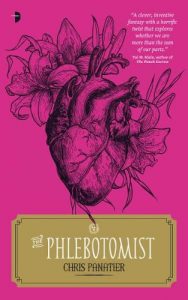 outside of the Discworld where an older female protagonist has properly defined agency)
outside of the Discworld where an older female protagonist has properly defined agency)
[CH]: Oooh I have an example – in Chris Panatier’s The Phlebotomist, the protagonist is a pink haired grandmother! And not a pastel pink, but a bright and crazy pink.
[GH] Yes you’re right! It makes such a change to see an older woman protagonist given some agency. Usually these older figures tended to hover in the background, offering pearls of wisdom or a cryptic bit of advice before disappearing back into the ether. No character of her own at all.
[CH]: So she’s essentially an accompaniment to someone else’s quest? Yes, I can see that. In folklore and traditional tales, the only women who had strength and demonstrated it tended to be witches – and bad ones, at that! It was as if women could only assert subversive, tricksy power, and could never mean good unless they were serving someone else.
[GH]: Yes, SFF has really developed over the last few years, and there are some incredible books coming out with truly layered female characters. It’s a whole new world of perspectives we suddenly have access to which is wonderful!
[CH]: It IS wonderful!
[GH]: You have a romance of sorts in Composite Creatures. Would you like to talk about it?
[CH]: Yes – it’s a romance ‘of sorts’, but one that isn’t as it seems.
I can’t really say too much about it, but that romance says a lot about the world that the novel is set in. How it’s constructed, and how it’s perceived by the outside world.
But what about your upcoming work, Gabi? What are those protagonists like? Are they women too, and how are they different to Miriat and Salka?
[GH]: Ah, yes of course. I can’t say too much about it just yet. But I do come back to the duality of nature and the concept of suppression of your natural instincts for the benefit of the outside world and the breaking point when that becomes no longer possible.
What about you?
[CH]: Well, my next novel is actually about a man! But it tackles universal themes, for sure. Loneliness in a digital age, and an inability to communicate. But I’ll be starting another novel later this year with a very strong female in the lead role – but I can’t say too much about that yet!
[GH]: I can’t wait to read it!
A huge thank you to Gabriela and Caroline for joining us for Women In SFF!
If you wanted to know more about their characters discussed above, follow the smart links to find your favourite retailer:
The Second Bell | Composite Creatures
About the authors:
 Gabriela Houston is a London-based writer. She was born in Poland and raised in a book-loving household on the nourishing diet of mythologies, classics and graphic novels. She had spent much of her early school years holed up in the library, only feeling truly herself in the company of Jack London’s trappers and Lucy Maud Montgomery’s red-headed orphan, among many others.
Gabriela Houston is a London-based writer. She was born in Poland and raised in a book-loving household on the nourishing diet of mythologies, classics and graphic novels. She had spent much of her early school years holed up in the library, only feeling truly herself in the company of Jack London’s trappers and Lucy Maud Montgomery’s red-headed orphan, among many others.
She came to the UK at 19 to follow her passion for literature and she completed her undergraduate and Masters degrees at Royal Holloway, University of London.
After her studies she worked in publishing for a few years. She now lives with her family in Harrow, where she pursues her life-long passion for making stuff up.
She’s the cohost of a YouTube channel, Bookish Take, which focuses on a writer’s journey from the initial idea through to the publication process and beyond!
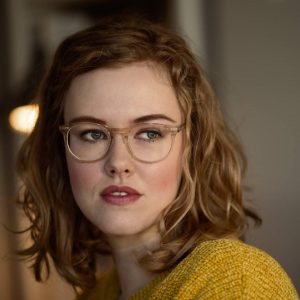 Caroline Hardaker lives in the north east of England and writes quite a lot of things. She earned her BA (English Literature) and MA (Cultural and Heritage Studies) from Newcastle University, and her main problem is limiting herself to one idea at once, or maybe two ideas, or three…
Caroline Hardaker lives in the north east of England and writes quite a lot of things. She earned her BA (English Literature) and MA (Cultural and Heritage Studies) from Newcastle University, and her main problem is limiting herself to one idea at once, or maybe two ideas, or three…
Caroline’s debut poetry collection, Bone Ovation, was published by Valley Press in 2017, and her first full length collection, Little Quakes Every Day, was published by Valley Press in November 2020.

[…] Gabriela Houston and Caroline Hardaker joined us on the Hive for a conversation about the women in SFF they’ve written. […]
[…] Bookish Take – Women In SFF Edition: Guest Post by Gabriela Houston and Caroline Hardaker | Th… […]